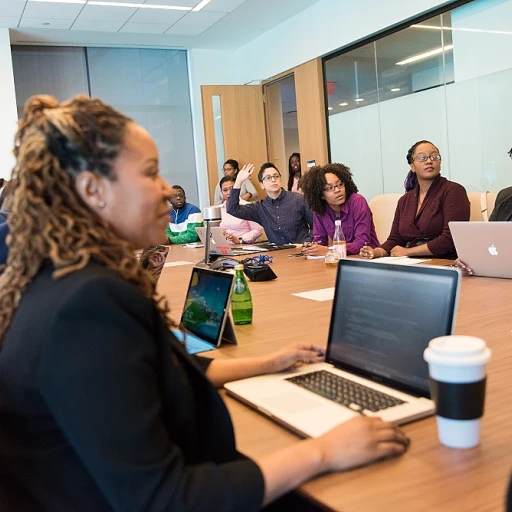Understanding the 7 Habits Framework
Framework for Effective Leadership
The journey to becoming an effective leader often incorporates structured habits, as established by the well-known framework within the book suggestion The 7 Habits of Highly Effective People by Stephen Covey. These covey habits aren't just principles for personal growth but are essential for leaders at every level, from middle school students exploring leadership life skills to seasoned professionals seeking to level up their mentoring capabilities.
This highly effective framework is designed to build a foundational structure on which people can develop their leadership qualities. Habits that are cultivated early, such as in an elementary school setting, can pave the way for the lifelong skills necessary for professional success. Schools that implement leader school programs often see a positive shift in school culture, helping students to not just learn academic subjects but also critical life skills necessary for becoming a habit proactive leader.
Student Engagement as a Core Initiative
One of the fundamental elements within this framework is the engagement at the student level. Understanding and implementing habit principles such as "Begin with the End in Mind" and "Put First Things First" are crucial steps in developing a proactive mentoring strategy. These principles can guide both mentors and mentees in setting clear, targeted goals.
The integration of leadership habits into school systems offers high potential for fostering happy kids who thrive not only academically but socially and emotionally. Effective people often start their leadership journey at a young age. By nurturing these habits early, schools and leaders can help children develop a mission statement that aligns with their personal and academic goals, thus achieving a win-win situation in educational environments.
For those seeking to refine their mentoring skills further, it may be wise to explore masterful soft skills essential traits. This can be particularly relevant for those striving to build impactful mentor-mentee relationships, cultivating an environment where students can flourish and reach their full potential. To learn more, you can explore the traits of effective tutoring.
Habit 1: Be Proactive in Mentoring
Embracing Proactivity in Mentoring
In the realm of professional mentoring, the first habit, being proactive, is a cornerstone of effective leadership. This concept, derived from the teachings of Stephen Covey, emphasizes taking initiative and responsibility for one's actions. Proactivity is not just about anticipating future challenges but also about empowering both mentors and mentees to shape their own paths.
When mentors embrace proactivity, they set a precedent for their mentees to follow. This approach fosters a culture of self-reliance and initiative, essential traits for any aspiring leader. In schools, particularly at the elementary and middle school levels, instilling this habit early can help students develop into highly effective individuals. By encouraging children to take charge of their learning and life skills, mentors can significantly influence their future success.
Proactivity in mentoring also involves creating a supportive environment where mentees feel safe to express their ideas and take calculated risks. This environment nurtures creativity and innovation, qualities that are indispensable in today's fast-paced world. Leaders who practice this habit are often seen as role models, inspiring others to adopt similar proactive behaviors.
Moreover, implementing proactive strategies in mentoring can lead to a win-win situation for both parties. Mentors who actively engage with their mentees not only help them achieve their goals but also refine their own leadership skills. This mutual benefit strengthens the mentor-mentee relationship, making it more productive and rewarding.
For those interested in mastering this art, mastering the art of mentoring your team in interviews provides further insights into how proactive habits can be effectively integrated into mentoring practices.
Habit 2: Begin with the End in Mind
Prioritizing Key Areas for Professional Advancement
Emphasizing the significance of prioritizing essential aspects of professional development, leaders in mentoring utilize effective habits to guide their mentees. By understanding what truly matters, mentors can allocate their energy and resources efficiently, ensuring that every interaction is both productive and meaningful.
An essential aspect of putting first things first revolves around aligning actions with objectives. This principle, derived from the teachings of leadership frameworks, highlights the importance of identifying goals and crafting plans to achieve them, thereby setting mentors and mentees on a path toward success. It's an approach widely adopted in high-level schools where leadership is cultivated to prepare students for their future endeavors.
One practical way mentors can apply this principle in their sessions is through the development of a clear mission statement. This not only helps in setting the vision but also in formulating strategies that align with it. Crafting such statements encourages both mentors and mentees to clarify their intentions and focus on what truly matters, fostering an environment where both parties can learn and win.
The idea of prioritizing aligns closely with another habit: being proactive. Mentors with a proactive mindset are better equipped to identify and address obstacles early, ensuring that their mentees remain on track toward their goals. Such practices are foundational in cultivating effective leadership skills akin to those outlined by experts in the field and it significantly shapes the overall experience of helping students at all educational levels, from elementary to middle school.
From the literature on leadership such as those recommended by Stephen Covey, to practical resources like enhancing your skills as a professional mentor, these habits essentially lay the groundwork for a more structured and fulfilling mentoring experience. By adhering to these principles, mentors can transform the culture of learning and leadership in both academic and professional settings.
Habit 3: Put First Things First in Professional Development
Prioritizing Professional Development
In the realm of professional mentoring, it is crucial to prioritize tasks that align with long-term goals. This principle, often referred to as "Put First Things First," is one of the essential habits highly effective leaders cultivate. It emphasizes the importance of focusing on activities that contribute to meaningful professional development rather than getting bogged down by urgent but less important tasks.
Effective leaders understand that time is a finite resource. By prioritizing their schedule to reflect their mission statement and core values, they ensure that their actions are aligned with their ultimate objectives. This is particularly relevant in a mentoring context, where both mentors and mentees must be clear about their goals and the steps necessary to achieve them.
Implementing the Habit in Mentoring
For mentors, helping their mentees to "put first things first" involves guiding them to identify their most important tasks and encouraging them to focus on these priorities. This might involve setting up regular check-ins to discuss progress and challenges, ensuring that mentees are on track to reach their professional goals. By doing so, mentors not only help their mentees succeed but also reinforce their own leadership skills.
- Time Management: Encourage mentees to develop effective time management skills, which are crucial for balancing various responsibilities.
- Goal Setting: Assist in setting clear, achievable goals that align with their career aspirations.
- Prioritization: Teach the importance of prioritizing tasks that will have the most significant impact on their professional growth.
By adopting this habit, mentors can help their mentees build a solid foundation for their careers, much like how schools focus on instilling life skills in students. This approach mirrors the educational framework seen in elementary and middle schools, where students are taught to prioritize their studies and extracurricular activities to foster a balanced school culture.
Incorporating this habit into mentoring practices not only benefits the mentees but also enhances the mentor's ability to lead effectively. It is a strategy that reflects the teachings of Stephen Covey, whose book "The 7 Habits of Highly Effective People" has been instrumental in shaping leadership and mentoring strategies worldwide.
Habit 4: Think Win-Win in Mentor-Mentee Relationships
Fostering Mutual Understanding in Mentoring
In the realm of professional mentoring, fostering a mutual understanding between mentors and mentees is crucial. This principle, akin to Stephen Covey’s insights in his highly effective people book, emphasizes the need to prioritize listening before being understood. By truly understanding the perspectives of mentees, mentors can cultivate a deeper, more meaningful relationship that goes beyond superficial guidance. Let's explore how this habit of understanding can be translated into practical mentoring strategies.
Leaders and mentors alike can draw from their experiences in elementary schools and workplaces. Recognizing that proficiency in a language isn't synonymous with comprehension, they foster an environment where active listening is practice number one. High-level understanding goes beyond hearing words; it involves grasping the emotions, concerns, and aspirations of mentees.
Implementing this leadership habit in schools or a professional setting can greatly enhance the mentor-mentee dynamic. Mentors who practice active listening help mentees feel valued and understood, which significantly boosts their confidence and eagerness to learn. Whether the mentors are working with students in middle school or guiding professionals, the importance of this approach cannot be overstated.
This mutual understanding is not only beneficial but essential for creating win-win scenarios within mentor programs. Ensuring both parties' needs are met elevates the mentoring experience, making it more impactful and enduring. Such practices not only enhance the development of leadership skills but contribute to healthier school cultures and workplaces overall.
For those seeking to further enhance these essential life skills, Covey's habits happy framework provides an ideal foundation. Leaders and educators operating at various levels, from elementary to professional settings, benefit from incorporating these strategies into their everyday interactions.
Habit 5: Seek First to Understand, Then to Be Understood
Understanding Before Being Understood
In the journey of professional mentoring, one of the most crucial aspects is the ability to truly understand your mentee before seeking to be understood. This habit, as highlighted in the principles of effective leadership, is about active listening and empathy. It’s not just about hearing words; it’s about grasping the underlying thoughts and emotions.
Mentors who excel in this habit create a supportive environment where mentees feel valued and heard. This is akin to the nurturing environments in elementary and middle schools where students are encouraged to express themselves freely, fostering a culture of trust and openness. Such an approach not only helps in building strong mentor-mentee relationships but also enhances the overall school culture, promoting happy kids and effective learning.
Building Empathy and Communication Skills
Implementing this habit in professional mentoring requires developing empathy and strong communication skills. These are life skills that leaders at any level, from elementary school students to high-level executives, need to cultivate. By focusing on understanding first, mentors can tailor their guidance to the specific needs and goals of their mentees, helping them to achieve their mission statement and life goals.
Stephen Covey, in his book on habits of highly effective people, emphasizes the importance of this approach. It’s about creating win-win situations where both the mentor and mentee benefit from the relationship. When mentors take the time to understand their mentees' perspectives, they can provide more relevant and impactful guidance, much like how effective teachers adapt their teaching methods to suit the learning styles of their students.
Practical Steps for Mentors
- Active Listening: Practice listening without interrupting. Focus on what your mentee is saying, and reflect back what you hear to ensure understanding.
- Empathy Building: Try to put yourself in your mentee’s shoes. Understand their challenges and aspirations at a deeper level.
- Open-Ended Questions: Encourage your mentee to share more by asking questions that require more than a yes or no answer.
- Feedback Loop: Create a feedback loop where both you and your mentee can share thoughts and suggestions openly.
By focusing on understanding first, mentors not only enhance their own leadership skills but also help their mentees to grow into effective leaders themselves. This habit, when practiced consistently, can transform the mentoring experience, making it a powerful tool for personal and professional development.









